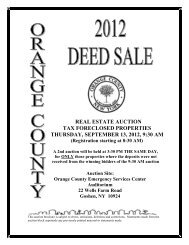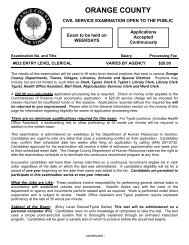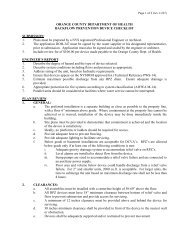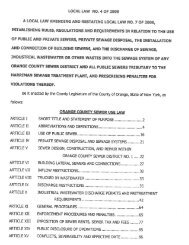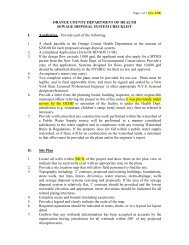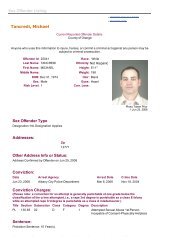A School Waste, Reduction, Reuse, Recycling, Composting & Buy ...
A School Waste, Reduction, Reuse, Recycling, Composting & Buy ...
A School Waste, Reduction, Reuse, Recycling, Composting & Buy ...
Create successful ePaper yourself
Turn your PDF publications into a flip-book with our unique Google optimized e-Paper software.
MERCURY IN SCHOOLS<br />
Mercury is a toxic metal that has historically been used in high school chemistry labs<br />
because of its unique chemical and physical properties. However, due to an increased<br />
awareness of the health and environmental impacts, as well as some recent costly spill<br />
incidents, there has been a concentrated effort to eliminate mercury from school<br />
curriculums and safely manage existing supplies. Check out this website for more<br />
information on mercury - www.newmoa.org/prevention/mercury/schools/ and you can check<br />
out our website - www.dec.state.ny.us/website/dshm/redrecy/mercury.htm<br />
Health Impacts<br />
Mercury exposure can occur through inhaling mercury vapors, or drinking water and eating<br />
fish contaminated with mercury and mercury compounds. Mercury is toxic to the central<br />
nervous system and internal organs. Mercury can cause harm even at low exposures. At high<br />
exposure levels, mercury may damage the brain and kidneys. Symptoms of mercury<br />
poisoning include tremors, changes in vision or hearing, headaches, irritability, and<br />
behavioral changes. The EPA has determined that methyl mercury and mercuric chloride are<br />
possible human carcinogens. Mercury passes easily across the placenta and exposure to<br />
developing fetuses can cause brain damage, mental retardation, seizures, blindness and an<br />
inability to speak.<br />
Managing Mercury in <strong>School</strong>s<br />
<strong>School</strong>s do not need elemental mercury. The human health and environmental risks<br />
associated with handling mercury do not justify its use in a school classroom. <strong>School</strong>s should<br />
hire a licensed hazardous waste handler to clean out any mercury, mercury compounds,<br />
mercury barometers and other hazardous chemicals not being used. Mercury fever<br />
thermometers can be replaced with digital equivalents.<br />
Managing Mercury Spills<br />
If a mercury spill occurs at your school, regardless of the amount, contact your local Health<br />
Department.<br />
You may want to contact your Regional New York State Department of Environmental<br />
Conservation for more information. Remember to dispose of mercury through a licensed<br />
hazardous waste vendor.<br />
Mercury can be found in: fever and laboratory thermometers; thermostats; switches;<br />
relays; gauges: manometers, barometers, vacuum; thermostat probes; fluorescent<br />
lamps; mercury vapor lamps; metal halide & high pressure sodium lamps.<br />
- 30 -





